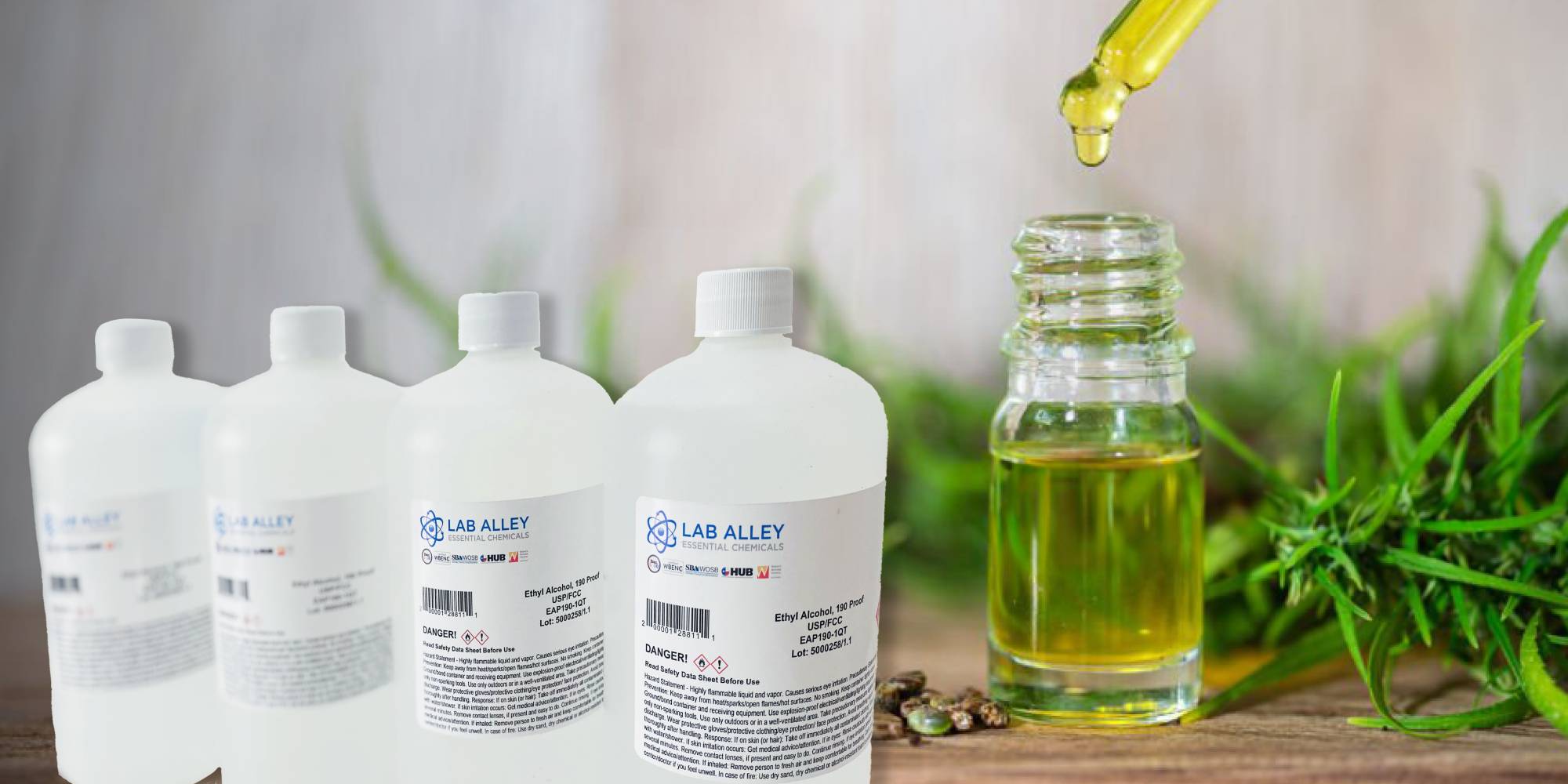Is Ethanol Extraction for CBD Safe?
By Jillian Jastrzembski

Ethanol extraction is a popular method used to extract CBD from cannabis. But is it safe?
In this article, we’ll explain how ethanol extraction works, and we’ll assess safety factors for consumers, workers, and the environment.
What is ethanol extraction?
Ethanol is best known as the alcohol that we drink, but it is also a very useful solvent. In fact, because it is formed during fermentation of sugars (as in wine or other alcoholic beverages), it was one of the first solvents to become available to humans – possibly second only to water.
Chemical extraction applies the use of a solvent (such as ethanol) to “pull” certain molecules from a matrix. Imagine it’s a few hundred years ago and you don’t have modern pharmaceuticals. Instead, you have a collection of herbs, which themselves contain a pharmacopeia of bioactive compounds. How can you get just the important compounds from those herbs so that you don’t have to eat the whole plant?
You also don’t have modern-day solvents available to you. What you do have is water, ethanol, and maybe some oils.
As it turns out, there are a lot of cases where ethanol would be your best option. In fact, there are plenty of cases where ethanol is still your best option, and that’s why it is still used today for plant extractions.
Extraction chemistry follows the principle of “like dissolves like.” That means that we always want a solvent that is chemically similar to the molecules of interest. Ethanol is special, because it is not as polar as water, but it is still much more polar compared to lipids. This intermediate polarity allows it to walk the middle ground, similar to many biologically active compounds.
Ethanol extraction for CBD: Pros and Cons
CBD, or cannabidiol, is one of the most important biologically-active compounds present in hemp and cannabis. Ethanol extraction is one of the oldest, yet still common, methods used to extract CBD from hemp.
CBD is a fat-soluble molecule, and considerably less polar than ethanol. Chemically speaking, a more hydrophobic solvent (like butane or propane) can achieve higher yields of CBD. Raising the extraction temperature can help improve solubility and increase CBD yields. That said, CBD is still more polar compared to THC.
The polar nature of ethanol also means that it is more likely to extract additional undesirable hydrophilic compounds. This will require that additional purification steps, like winterization, be taken later on. This problem can be mitigated by using cold solvent extraction, in which extraction temperatures are kept low to limit the solubility of chlorophylls and waxes.
On the other hand, ethanol makes up for some inefficiencies because it is a green solvent with GRAS (generally recognized as safe) status. It is the preferred choice for consumer safety and environmental reasons.
Is ethanol extraction safe for consumers?
Ethanol has been used as a solvent (and consumed on its own) for thousands of years. Food grade ethanol is considered safe according to the Food and Drug Administration. It may be preferred to other solvents (despite giving lower yields), since residual levels of solvent remaining in the extract are not considered dangerous.
Is ethanol extraction safe for the environment?
Another major advantage of ethanol is that it is a green solvent. In fact, according to data from influential pharmaceutical companies, ethanol is one of the greenest solvents available. It is a better environmental choice compared to alternative CBD extraction solvents, such as hydrocarbons. The “greenness” of a solvent accounts not only for safety hazards and health concerns, but also for energy demand. This includes the energy required to produce the solvent, as well as the energy required to recycle or recover the solvent.
Is ethanol extraction safe for workers?
Finally, ethanol can also be a safer choice for manufacturers. Alternative extraction processes with carbon dioxide or hydrocarbon solvents, can require pressurized systems, which could pose a risk of explosions.
Conclusion
To sum it up, ethanol is an all-around safe and healthy choice for CBD extraction from hemp. It checks all the boxes, from consumer health, to manufacturer safety, and environmental impact.
In fact, ethanol offers so many safety-pros, that it is often selected as a solvent despite being out-performed by less polar options. For example, hydrocarbons could be otherwise better suited to optimize CBD yields, but they do not have the same advantages in terms of safety and greenness.
In the case of CBD extraction, sometimes the oldest choice is still the best choice.
Lab Alley is pleased to provide you with a full selection of high-quality food grade ethanol products, including organic, kosher, and vegan options. If you have any questions about our products, please feel free to contact us for more information!

